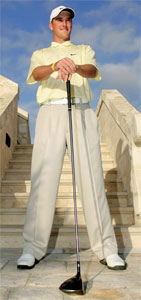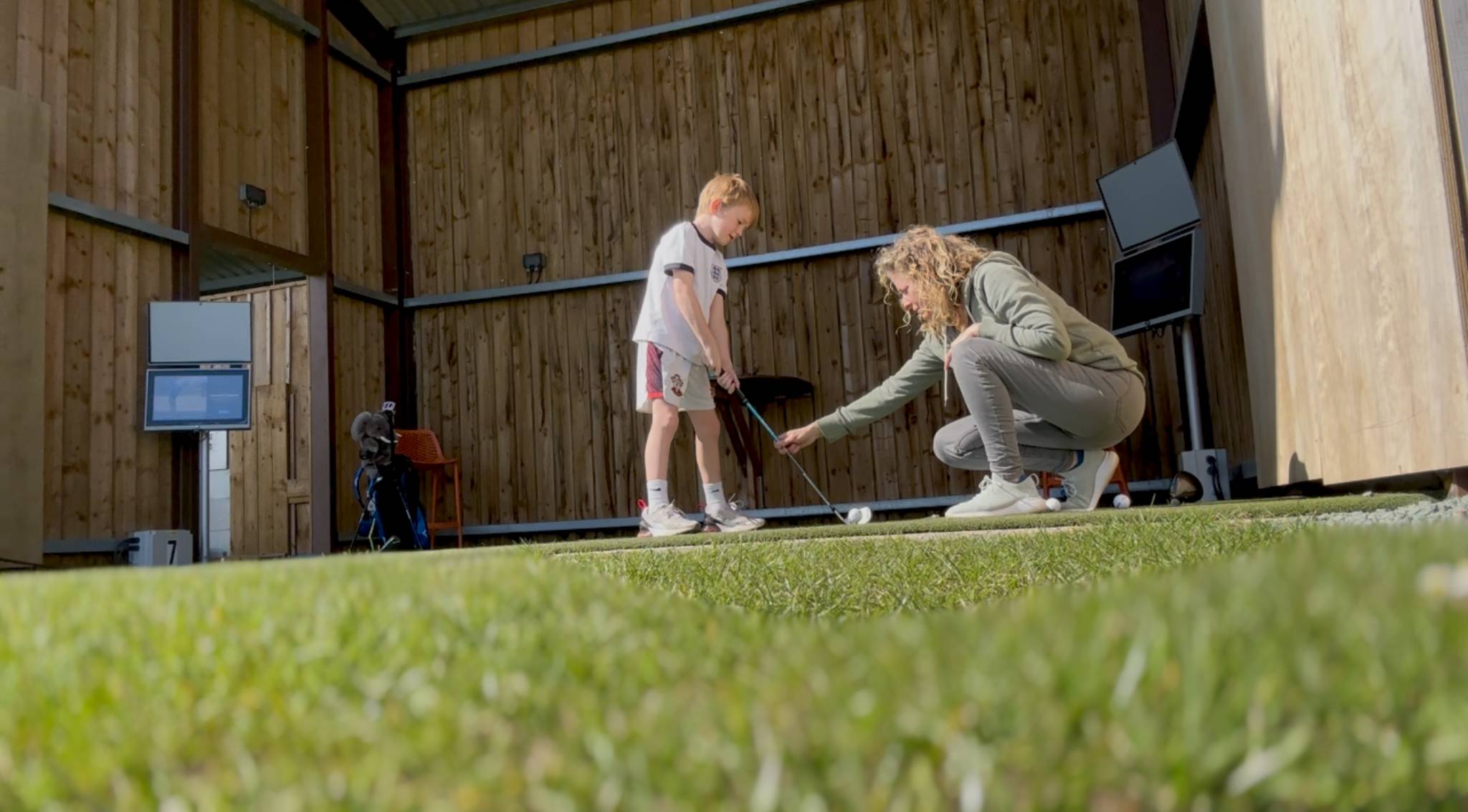Golden Ticket
It’s not all private jets, fast cars and five-star hotels in the world of the professional golfer as Ben Hunt discovers with an in-depth profile of life on the Challenge Tour, the European Tour’s poor relation.

It?s not all private jets, fast cars and five-star hotels in the world of the professional golfer as Ben Hunt discovers with an in-depth profile of life on the Challenge Tour, the European Tour?s poor relation.
When Marc Warren teed up in the HSBC Champions Tournament alongside the likes of Tiger Woods, Vijay Singh and Michael Campbell it was a world away from what he was used to.
The 24-year-old Scot had come straight from the Challenge Tour where budget flights and death-trap taxi rides are the preferred methods of transport and prize funds would not even pay for a round of golf with the world number one.
The Challenge Tour provides wannabe stars with their first taste of tour life but the reality is the majority of them are losing money. In order to cut costs the players travel at inconvenient times, often sharing cramped rooms during events.
But for the lucky few who finish in the top 20 on the Order of Merit, the dream of playing against the big guns can become a reality. Warren, who topped the 2005 rankings, is delighted to be waving farewell to the Challenge Tour. ?I?m over the moon,? he said after securing his card. ?My aim was to win the Order of Merit and to qualify for the HSBC tournament.
?It was fun playing with the likes of Tiger Woods and Vijay Singh. It was the biggest tournament I have ever played in and what I have been practising for. Now I am really looking forward to next year.
?Last season the first half of it did not go the way I wanted it to, but since I changed coach things have changed about. Now I want to get my card
Get the Golf Monthly Newsletter
Subscribe to the Golf Monthly newsletter to stay up to date with all the latest tour news, equipment news, reviews, head-to-heads and buyer’s guides from our team of experienced experts.
early otherwise I will be back on the Challenge Tour.?
Another player heaving a huge sigh of relief is Andrew Butterfield. The Bromley player also earned his main card by finishing fourth in the final standings. ?At the beginning of the year I wanted to finish top 20 so I knew I wouldn?t have to go to tour school,? he said. ?I made that my goal because it isn?t a very pleasant experience. I never want to go back there and that is part of the driving force to do well on the Challenge Tour.?
Welshman Kyron Sullivan narrowly missed out on his card after falling £1,500 short of 20th place. He says the Challenge Tour offers a vital learning experience. ?I played amateur golf for Wales and decided to have a go at being a professional,? he said. ?I have played on the Europro Tour for a couple of years and this is my second year on the Challenge Tour and I know I can move forward.
?The Challenge Tour is a great stepping stone to get onto the main tour where you are treated like royalty with bigger prize winnings, better venues and better hotels. A lot of guys do skimp and scrape on this tour, stay in cheap hotels and travel lighter.
?Before turning professional I worked and if I?d kept my job I?d be on 30 grand a year and living comfortably whereas I only just made a small profit in 2004.
I won £28,000 and it cost me £23,000. I know you travel the world, but you still have to pay the mortgage. I try to stay in some basic hotels. The last one was not good, there was no TV, cold showers and the breakfasts were, shall we say, very slimming!?
?The rooms are small, noisy and full of flies. You just wish you were back home. If I was on holiday I wouldn?t accept it, but you look at the bigger picture and get on with it.?
Although times can be hard, the experience of life on the Challenge Tour can bond players closer together.
?It?s a much friendlier tour,? says Butterfield, who has already played on the main European Tour.
?Everybody rooms and travels together and stays in the same hotels. You need to do that to make it a little bit cheaper.
?We play for a 10th of the money that you would do on the main tour so you need to share with people, share a cab, you need to talk about flights. That builds up the camaraderie more. You do things together and you rely upon each other for conversation.
?Sometimes it is like staying in a dormitory. The rooms are small, noisy and full of flies. You just wish you were back home. If I was on holiday I wouldn?t accept it, but you look at the bigger picture and get on with it.?
Stephen Browne secured his place on the European Tour after winning almost £41,000 to finish 19th in the Challenge Tour rankings. The Irish golfer, who won the European Amateur Championship in 2001 and who has played on the Challenge Tour for four years, agrees life can be difficult.
?You do have to look for the cheapest places to stay. You are not on the Challenge Tour to make money,? he says.
?You try not to stay in a bad place that could upset your form but it is not often I stay in a five-star hotel. None of us are out here for the money. We are here to get onto the European Tour and make money eventually, but we are here for the right reason ? to play golf and to improve.?
He says in the past players have supplemented their incomes by taking on other jobs but that it is getting harder to supplement your income in this way. ?Not many people juggle jobs and play on the tour. Two years ago Graeme Storm worked in a cream cake factory over the winter and then had a good year on the Challenge Tour.
Now look what he has earned on the European Tour [nearly £500,000 in 2005]. I don?t think he will be going back to working in a factory!
?And in 2004 Lee Slattery worked in Next before he won his card, but now on the Challenge Tour we are playing all the time. There is no winter break ? it is a full-time job and it is unlikely others will have jobs.?
?A friend of mine played out there and said the car park was full of Ferraris so there is such a major difference.?
Life on the Challenge Tour is very different to that on the American equivalent ? the Nationwide Tour ? where televised coverage means heavier sponsorship and bigger purses.
?In America the guy who wins the Nationwide Tour wins about $500,000 per year,? says Browne. ?You just can?t draw comparisons between the Challenge Tour and America. A friend of mine played out there and said the car park was full of Ferraris so there is such a major difference.?
It is this lavish lifestyle that the golfers are searching for and the quest for success can be highly stressful. The sight of golfers wrapping clubs around trees is commonplace here, particularly when it comes down to the final event ? the Grand Final ? where one stroke can be the difference between striving for and actually living the dream.
?You do see guys lose it on the course,? says Browne. ?There is a lot of frustration as you can be playing well but winning little money. I won in Kazakhstan and got £27,000 but the prize for second was under £11,000, so there is a massive gap between prize money.
?If you can finish well then that?s good, but if you are finishing 20th every week then you are going to be making a serious loss. It is difficult because you can go home and tell your friends you played well but all you won was £500 and people don?t believe you played that well.?
For a real insight into what life is like on the Challenge Tour you need only have watched the players leaving this year?s Grand Final in Italy. While queuing patiently for their Ryanair flight from Brindisi airport, the Lecce football team arrived and were ushered quickly through passport control, autograph hunters in tow. The golfers looked on in awe, secretly hoping they?d one day have planes of their own.
-
 Uneekor's New EYE XR, AI Trainer, and GameDay Software Set To Shake Up The Golf Simulator Industry
Uneekor's New EYE XR, AI Trainer, and GameDay Software Set To Shake Up The Golf Simulator IndustryArriving on April 14, 2025, Uneekor deliver an unparalleled combination of precision and immersive gameplay designed to elevate every golfer’s experience.
By Conor Keenan
-
 I’m A PGA Golf Coach - Here's Why I Made Sure My Kids Can Play Golf
I’m A PGA Golf Coach - Here's Why I Made Sure My Kids Can Play GolfFrom life lessons to lifelong friendships, Top 50 Coach Katie Dawkins on what golf can give your children
By Katie Dawkins